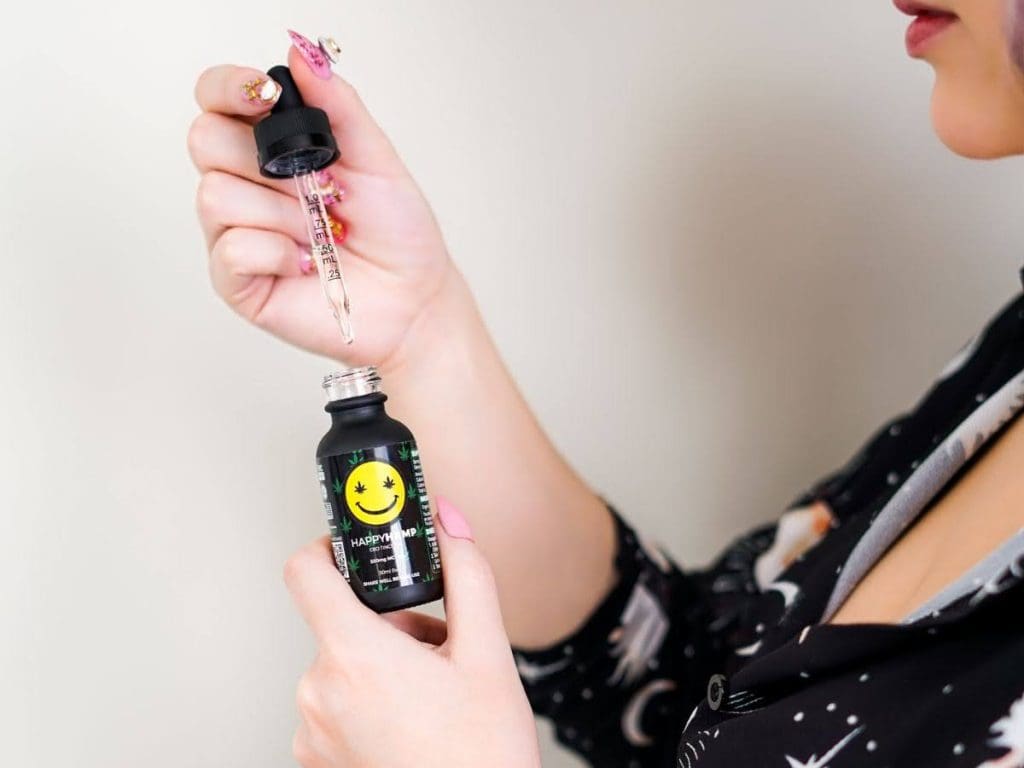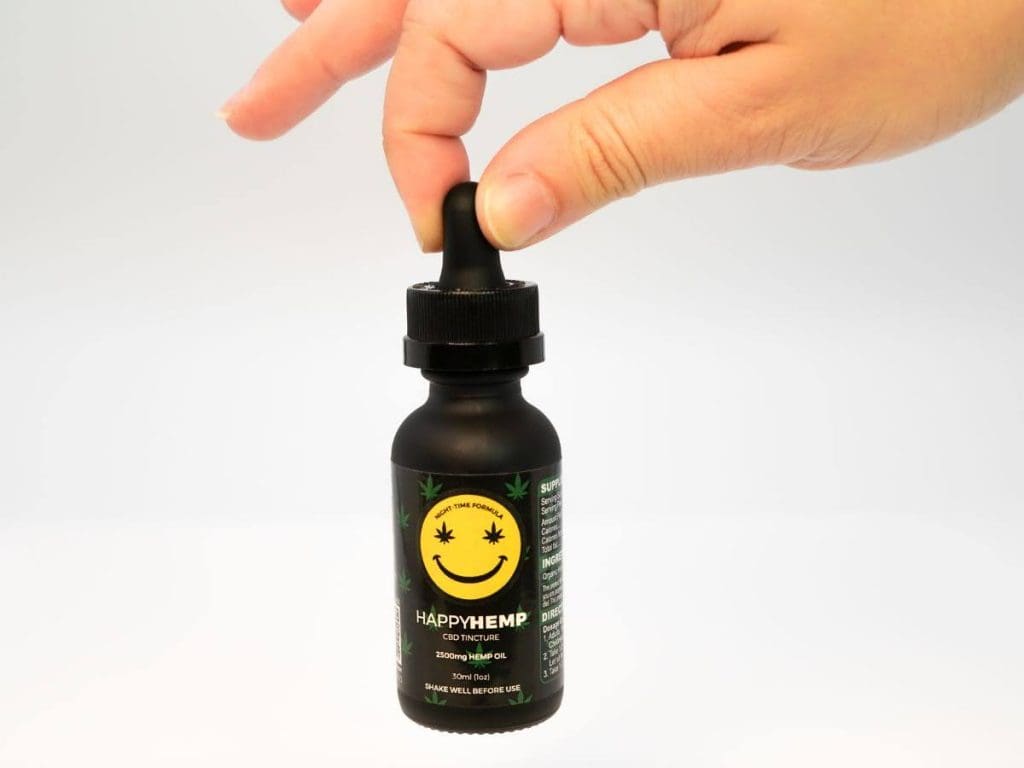Key Takeaways:
- CBD’s Interaction with Pain: CBD offers potential pain relief through its interaction with the endocannabinoid system, exhibiting both anti-inflammatory and analgesic properties.
- Importance of Product Quality: The effectiveness of CBD for pain management is closely linked to the quality of the product, which is determined by the source of hemp, extraction methods, and third-party testing.
- Choosing the Right Product: The form of CBD (oils, topicals, edibles) should be chosen based on the type and location of pain, with considerations for product potency and individual preferences for the most effective relief. For a tailored approach to nighttime pain relief, Happy Hemp’s Hemp Oil CBD Tincture is designed to support a restful night’s sleep while addressing discomfort.
In today’s search for effective and natural solutions to chronic pain, CBD has emerged as a promising option. With its growing popularity and legal acceptance, understanding how CBD can aid in pain relief is more important than ever. This article aims to explore the best CBD options for managing pain, backed by science and tailored to meet individual needs. Through clear explanations and expert insights, we’ll navigate the complexities of CBD products, ensuring you’re informed and ready to make the best decision for your health and well-being. For those looking for a reliable option, consider the Happy Hemp Hemp Oil CBD Tincture, a night-time formula designed to support pain relief and promote a restful night’s sleep, helping you wake up feeling refreshed and ready to take on the day.
Ready For Natural Pain Relief? Discover CBD With Happy Hemp
Explore Happy Hemp’s CBD for Pain Relief Today! |
Understanding CBD
CBD, short for cannabidiol, is a non-psychoactive compound found in cannabis plants. Unlike THC, CBD does not cause a high, making it an appealing option for those seeking pain relief without mind-altering effects. It’s extracted mainly from hemp, a cannabis variant with high CBD and low THC levels. Interest in CBD’s health benefits has surged, with a particular focus on its potential for pain management. This has led to the availability of a variety of CBD products aimed at enhancing well-being.
How Does CBD Contribute To Pain Relief?
Interaction With The Endocannabinoid System
CBD aids in pain relief by engaging with the body’s endocannabinoid system (ECS), which regulates pain, mood, and sleep. The ECS has receptors throughout the body, and CBD’s interaction with these receptors can modify pain perception. This interaction is crucial in understanding CBD’s potential to alleviate pain. Studies indicate that CBD can reduce inflammation and influence how pain signals are processed, making it a valuable tool for pain management. This mechanism highlights CBD’s therapeutic potential in treating various pain-related conditions.
Anti-Inflammatory Properties
CBD’s ability to reduce inflammation is central to its pain-relief properties. Chronic inflammation often leads to persistent pain, complicating many health conditions. By suppressing inflammatory processes, CBD offers a promising approach to managing conditions like arthritis. Its anti-inflammatory effects are backed by research, emphasizing CBD’s role in enhancing the quality of life for those with chronic pain. This action not only addresses the pain itself but also the underlying inflammation contributing to it.
Analgesic Effects
CBD possesses analgesic properties, offering another avenue for pain relief. It works by interacting with neurotransmitters in the brain to diminish pain signals. This is particularly beneficial for neuropathic pain, where traditional medications fall short. The analgesic effects of CBD, coupled with its safety and non-psychoactive nature, make it an appealing alternative to conventional painkillers. This aspect of CBD is crucial for those seeking effective pain management solutions without the side effects associated with other medications.
The Importance Of Quality In CBD Products
Third-Party Testing
Third-party testing is essential for ensuring the quality and safety of CBD products. It verifies CBD concentration, THC levels, and the absence of contaminants. Products that have been rigorously tested are more likely to provide the expected benefits safely. Consumers should prioritize products with accessible, transparent third-party test results. This transparency is key to trust and confidence in CBD products.
Source Of Hemp
The quality of CBD products starts with the hemp source. Hemp’s ability to absorb substances from its environment means the quality of soil and growing conditions directly impact the final product. Ethically sourced hemp indicates a brand’s commitment to quality and sustainability. Consumers should seek out products that are transparent about their hemp sourcing. This ensures the product is made from high-quality ingredients, reflecting the brand’s integrity.
Extraction Methods
The extraction method used to obtain CBD from hemp affects the product’s purity and safety. CO2 extraction is preferred for its efficiency and ability to produce a clean, potent product without harsh chemicals. This method ensures that CBD oil is free from contaminants, offering a high-quality, safe option for consumers. Products derived from CO2 extraction are generally considered superior. This highlights the importance of understanding extraction methods when choosing CBD products.
Types Of CBD Products For Pain Management
CBD Oils And Tinctures
CBD oils and tinctures are versatile, allowing for easy dosage adjustments. They are absorbed quickly when taken sublingually, providing prompt pain relief. This makes them suitable for both acute and chronic pain management. The variety of concentrations available enables individuals to tailor their use to specific pain levels. These characteristics make oils and tinctures a popular choice among CBD users seeking pain relief. For those looking to enhance their nighttime routine for better rest and relief, consider Happy Hemp’s Hemp Oil CBD Tincture. Its specially formulated night-time blend is designed to help you find tranquility and pain relief, setting the stage for a restful night.

CBD Topicals: Creams And Salves
CBD topicals are designed for localized pain relief. By applying them directly to the affected area, users can target the pain directly at its source. This is particularly useful for joint and muscle pain. The inclusion of other natural pain relievers in many topicals enhances their effectiveness. Topicals are a favored option for those with specific areas of pain who prefer not to ingest CBD.
Edibles And Capsules
Edibles and capsules provide a discreet and convenient way to consume CBD. They offer consistent dosing, making it easier to manage daily intake. While the onset of effects may be slower, the relief provided is generally longer-lasting. This format is ideal for those needing sustained pain relief throughout the day. Edibles and capsules are especially appealing to those who prefer not to taste CBD oil directly.
How To Use CBD For Pain Relief?
Determining Your Ideal Dosage
Finding the correct CBD dosage is essential for effective pain relief. Starting with a low dose and gradually increasing it helps identify the most beneficial amount with minimal side effects. This process, known as titration, is vital in achieving optimal pain management. Individual factors such as body weight and pain severity influence dosage requirements, emphasizing the need for personalization in CBD use.
Consistency Is Key
For chronic pain, regular and consistent use of CBD is crucial. Establishing a routine ensures a constant level of CBD in the body, enhancing its effectiveness in pain management. It may take time to see the full benefits, underscoring the importance of patience and consistency. This approach helps maintain effective pain relief over time, contributing to overall well-being.
Monitoring And Adjusting
As you use CBD for pain relief, it’s important to monitor its effects and adjust the dosage as necessary. This allows you to fine-tune your regimen for the best results. If improvements are not observed, consider trying a different product or formulation. Being mindful of how your body responds to CBD is key to finding the most effective solution for your pain.
Choosing The Right CBD Product For Your Pain
Consider The Type Of Pain
The specific type of pain you’re experiencing should guide your choice of CBD product. Oils and capsules may be better for generalized pain, while topicals are ideal for localized issues. This distinction is important in selecting the most effective product for your needs.
Assess Product Potency
The potency of a CBD product, measured in milligrams, plays a crucial role in its effectiveness. Higher potency may be necessary for severe pain, whereas lower potency might suffice for mild discomfort. Understanding the relationship between product potency and pain intensity is key to effective CBD use.

Read Product Reviews And Testimonials
Reviews and testimonials can provide insights into a product’s effectiveness for pain relief. Feedback from users with similar pain issues can help inform your decision. While individual experiences vary, reviews are a valuable resource in assessing a product’s potential benefits.
Final Thoughts On Best CBD For Pain
Finding the best CBD options for pain relief can significantly improve the quality of life for those suffering from chronic pain. By understanding CBD’s role in pain management, emphasizing the importance of product quality, and selecting the appropriate product type, individuals can effectively harness CBD’s therapeutic potential. As the body of research around CBD and pain relief continues to grow, its role in providing a natural, effective pain management solution becomes increasingly clear. For those looking to start their journey with a trusted product, Happy Hemp’s Hemp Oil CBD Tincture offers a high-quality, third-party tested option designed to support pain relief and enhance your well-being.
Read Also:
- CBD Gummies For Men: Tackling Stress, Pain, And More
- How CBD Gummies Can Enhance Your Sex Life
- How CBD Oil Can Benefit Your Feline Friend
Frequently Asked Questions About Best CBD For Pain
Is CBD legal for pain management?
Yes, CBD derived from hemp with less than 0.3% THC is federally legal in the United States. However, laws can vary by state, so it’s important to check local regulations.
Can CBD be used alongside traditional pain medications?
While CBD is generally considered safe, it can interact with certain medications. Always consult with a healthcare professional before combining CBD with other medications.
How long does it take for CBD to start working for pain relief?
The onset of effects varies by product type. Oils and tinctures can take effect within 30 minutes, while edibles and capsules may take 1-2 hours. Topicals can provide localized relief shortly after application.
Are there any side effects of using CBD for pain?
CBD is well-tolerated by most people, but some may experience mild side effects like dry mouth, drowsiness, or changes in appetite. These are typically minor and temporary.
Can CBD help with all types of pain?
CBD is effective for various types of pain, including neuropathic pain, inflammatory pain, and arthritic pain. Its effectiveness can vary depending on the individual and the cause of pain.
How do I know if a CBD product is of high quality?
Look for products that have undergone third-party testing, are transparent about their hemp sourcing, and use safe extraction methods. High-quality products will provide this information readily.
Does the form of CBD affect its effectiveness for pain relief?
The form of CBD (e.g., oil, topical, edible) can influence how it’s absorbed and how quickly it takes effect. The best form depends on the type and location of your pain.
Will using CBD for pain relief show up on a drug test?
Pure CBD should not cause a positive result on a drug test. However, full-spectrum products contain trace amounts of THC, which could potentially cause a positive test.
How often should I use CBD for chronic pain?
Consistency is key for managing chronic pain with CBD. Many find daily use provides the most consistent relief, but individual needs can vary.
Can I build a tolerance to CBD, requiring higher doses for pain relief?
Unlike many traditional pain medications, there is little evidence to suggest that users build a tolerance to CBD. However, individual experiences may vary, and dosage adjustments may be needed over time.
Sources:
- Martínez, V., Iriondo De-Hond, A., Borrelli, F., Capasso, R., del Castillo, M. D., & Abalo, R. (2020). Cannabidiol and Other Non-Psychoactive Cannabinoids for Prevention and Treatment of Gastrointestinal Disorders: Useful Nutraceuticals? International Journal of Molecular Sciences, 21(9). https://doi.org/10.3390/ijms21093067
- Hasbi, A., Madras, B. K., & George, S. R. (2023). Endocannabinoid System and Exogenous Cannabinoids in Depression and Anxiety: A Review. Brain Sciences, 13(2), 325. https://doi.org/10.3390/brainsci13020325
- Johnson, E., Kilgore, M., & Babalonis, S. (2022). Label accuracy of unregulated cannabidiol (CBD) products: measured concentration vs. label claim. Journal of Cannabis Research, 4(1). https://doi.org/10.1186/s42238-022-00140-1







